(AP) The World Economic Forum’s annual meeting has kicked off Monday in Davos, Switzerland.
The village in the Swiss Alps has been transformed into a glitzy venue for the four-day confab ostensibly dedicated to making the world a better place. The event is resuming in person after a two-year hiatus because of the COVID-19 pandemic, which also delayed this year’s meeting from its usual winter slot.
Thousands of corporate executives, government officials and other VIPs filled the conference venue, both to schmooze and listen to panel discussions on topics like sustainability, climate change and the Russia-Ukraine war.
Attendees also are visiting nearby pavilions on Davos’ main drag set up by companies like Intel, Accenture and Facebook owner Meta.
One of the main attractions on opening day is a virtual keynote speech by Ukrainian President Volodymyr Zelenskyy. There’s also a sizable Ukrainian government delegation attending in person, making their case for more Western support in the country’s fight against Russia.
Ukrainian President Volodymyr Zelenskyy says in a virtual speech at the World Economic Forum gathering that his country needs funding of at least $5 billion a month to rebuild.
He said Monday at the gathering of business elites and government officials in the Swiss town of Davos that tens of thousands of lives would have been saved “if we would have received 100% of our needs at once, back in February.”
He was referring to weapons, funding, political support and sanctions against Russia.
Zelenskyy also said Russia was blocking critical food supplies, such as wheat and sunflower oil, from leaving its ports and stealing some.
The head of U.N.’s World Food Program called for the ports to reopen, saying the region’s farmers “grow enough food to feed 400 million people.”
If such supplies remain off the market, WFP Executive Director David Beasley told The Associated Press in Davos that the world could face a food availability problem in the next 10 to 12 months, and “that is going to be hell on earth.”
The founder of the World Economic Forum says Russia’s war in Ukraine as well as climate change and the global economy are key issues at the gathering of business elites and government leaders in Davos, Switzerland.
Klaus Schwab said Monday in welcoming remarks that “this war is really a turning point of history and it will reshape our political and our economic landscape in the coming years.”
But also says the world is at “the tail-end of the most serious health catastrophe of the last hundred years — COVID-19.”
Schwab added that climate change and preserving nature is something to urgently address and that concerns about high inflation will affect how to look at the future of the global economy. He pointed to fears of people plunged into poverty and dying of hunger.
The head of the U.N.’s World Food Program is telling billionaires it’s “time to step up” amid the threat of rising food insecurity worldwide and says he’s seen encouraging signs that uber-tycoons like Elon Musk and Jeff Bezos are getting into the action.
WFP Executive Director David Beasley built upon a social-media standoff of sorts that he had with Musk last year, when the Tesla CEO challenged policy advocates to show how a $6 billion donation sought by the U.N. agency could solve world hunger.
Since then, Beasley told The Associated Press at the World Economic Forum gathering in Davos, Switzerland, that “Musk put $6 billion into a foundation. But everybody thought it came to us, but we ain’t gotten any of it yet. So I’m hopeful.”
He said of Musk: “We’re trying every angle, you know: Elon, we need your help, brother.”
Beasley said that message was for every billionaire because “the world is in real serious trouble. This is not rhetoric and B.S. Step up now, because the world needs you.”
The director of the Center for Oceans Solutions at Stanford University has called for the integration of ‘blue foods’ — a shorthand for fisheries and other aquatic products — into the global food system.
“Blue foods are an important part of the food system but generally ignored in global discussions and the future of food,” said Jim Leape. “The core challenge is to bring blue foods on to the main table as vital part of economic planning and recognize that most blue foods are produced by artisanal fishers and be sensitive and considerate of their daily challenges.”
Speaking at a panel on blue foods and responding to a question on producing aquatic foods sustainably, Leape called for a change on the perception of blue foods as they offer nutritious alternatives.
Ecuadorian environment minister Gustavo Manrique Miranda outlined measures his country was taking to promote blue foods, marine biodiversity, climate smart aquaculture and responsible tourism around the expanded Galapagos Marine Park.



